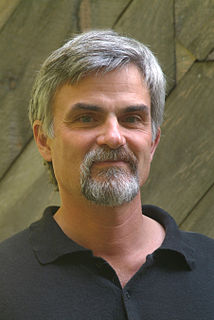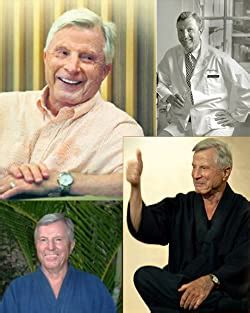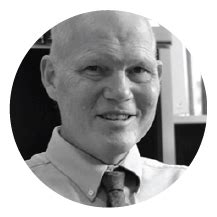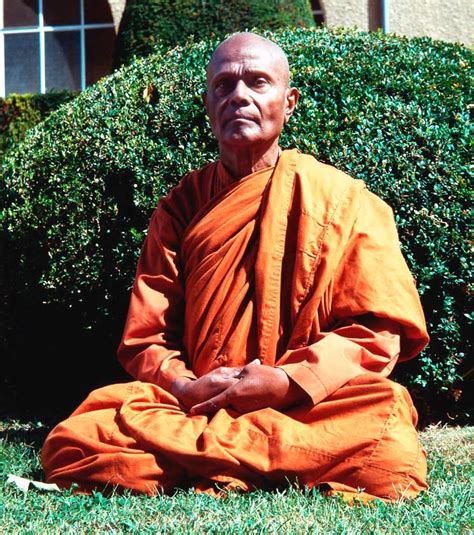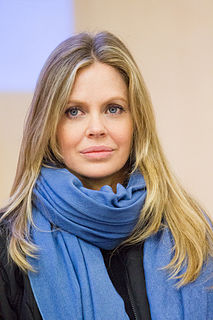Top 1127 Zen Buddhism Quotes & Sayings - Page 19
Explore popular Zen Buddhism quotes.
Last updated on April 22, 2025.
The incipient magician will confess his faith to a universal religion. He will find out that every religion has good points as well as bad ones. He will therefore keep the best of it for himself and ignore the weak points, which does not necessarily mean that he must profess a religion, but he shall express awe to each for of worship, for each religion has its proper principle of God, whether the point in question be Christianity, Buddhism, Islam or any other kind of religion.
I"m often accused of being irreligious, and I suppose it's for this very reason. Whether it's Christianity, Islam, Buddhism, Catholicism, Hinduism, Judaism, or any other ism, when a religioin is created on the subtle premise that God withholds his love and you must submit to the system to earn that love, I consider it the worst of corruptions... For centuries, the church has been telling us that if we want God to love us, we need to follow the rules. It's been far more important to focus on the sin problem than the love problem.
Christ remains the most influential figure in history. Any list of world-transforming individuals would no doubt include Moses, Buddha, and Muhammad. Moses, Buddha, and Muhammad, however occupy totally different places in Judaism, Buddhism, and Islam than Christ occupies in Christianity. Moses, Buddha, and Muhammad never professed to perform miracles; indeed they never claimed to be anything more than men. They viewed themselves simply as God's messengers. Christ is the only person in history who has defined a whole religion around his person.
I felt I was drawing close to that age, that place in life, where you realize one day what you'd told yourself was a Zen detachment turns out to be naked fear. You'd had one serious love relationship in your life and it had ended in tragedy, and the tragedy had broken something inside you. But instead of trying to repair the broken place, or at least really stop and look at it, you skated and joked. You had friends, you were a decent citizen. You hurt no one. And your life was somehow just about half of what it could be.
Not Christian or Jew or Muslim, not Hindu, Buddhist, sufi, or zen. Not any religion or cultural system. I am not from the East or the West, not out of the ocean or up from the ground, not natural or ethereal, not composed of elements at all. I do not exist, am not an entity in this world or the next, did not descend from Adam or Eve or any origin story. My place is placeless, a trace of the traceless. Neither body or soul. I belong to the beloved, have seen the two worlds as one and that one call to and know, first, last, outer, inner, only that breath breathing human being.
A person without an Apple watch is perfectly content with his present watch but when he sees his friends buying the watch, he will hanker for an Apple watch. The endless cycle of wanting, getting, and wanting again is part of the plot of Capitalism. It is the way Capitalism creates jobs. The only antidote is Buddhism that holds that people might be happier by renouncing desire rather than by striving to satisfy desire. But then how can the economy create enough jobs in a Buddhist society of "less is more."
There is a story in Zen circles about a man and a horse. The horse is galloping quickly, and it appears that the man on the horse is going somewhere important. Another man standing alongside the road, shouts, «Where are you going?» and the first man replies, «I don't know! Ask the horse!» This is also our story. We are riding a horse, and we don't know where we are going and we can't stop. The horse is our habit energy pulling us along, and we are powerless.
Zen brings creativity. And remember, if you want to be one with the creator, you will have to learn some ways of creativity. The only way to be one with the creator is to be in some moment of creativity, when you are lost. The potter is lost in making his pottery; the potter is lost while working on the wheel. The painter is lost while painting. The dancer is lost; there is no dancer, only the dance remains. Those are the peak moments, where you touch God, where God touches you.
I work in several different groups of pictures which act on and with each other - ranging from several abstracted manners to a form for the surreal. I have been called a preacher - but, in reality, I'm more generally philosophical. I have never made an abstracted photograph without content. An educated background in Zen influences all of my photographs. It has been said that my work resembles, more closely than any photographer, Le Douanier Rousseau - working in a fairly isolated area and feeding mostly on myself - I feel that I am a primitive photographer.
I see a vision of a great rucksack revolution thousands or even millions of young Americans wandering around with rucksacks, going up to mountains to pray, making children laugh and old men glad, making young girls happy and old girls happier, all of 'em Zen Lunatics who go about writing poems that happen to appear in their heads for no reason and also by being kind and also by strange unexpected acts keep giving visions of eternal freedom to everybody and to all living creatures.
It's pretentious to say, but my art is like a little Zen story, a story with a question mark at the end. People can take from it what they need. If somebody says, "Your art is very funny," I say, "You are totally right." If somebody says, "Your art is very sad," I say, "You are totally right." In Japan they say, "Your art is very Japanese, you even look Japanese.Your great-grandfather was most surely a Japanese man." And I say, "You are totally right."
Zen says that if you drop knowledge - and within knowledge everything is included; your name, your identity, everything, because this has been given to you by others - if you drop all that has been given by others, you will have a totally different quality to your being: innocence. This will be a crucifixion of the persona, the personality, and there will be a resurrection of your innocence. You will become a child again, reborn.
I thought, man, if you could run 100 miles, you'd be in this Zen state. You'd be the f**king Buddha. Bringing peace and a smile to the world. In my case, it didn't work. I'm the same old punk ass as ever. But there's always this hope that it'll turn you into the person you want to be. You know, like a better, more peaceful person. And when I'm out on a long run, the only thing in life that matters is finishing the run. For once, my brain isn't going 'bleh bleh bleh bleh.' Everything just quiets down, and the only thing going on is pure flow
I think East Asian countries, I think they're very fortunate to have Buddhism survive as a strong influence because right from the time when Buddha himself, 2,500 years ago, made the point about the importance of education, and the word "Buddha" also means enlighten[ed] or educated. So all the Buddhist countries, not only Japan and Korea and China and Hong Kong and Thailand but also even Burma and Sri Lanka, had a higher level of education.
If we had the consciousness of a cat or a dog, we would have it in us to become perfect Zen masters. We could gnaw on a bone, take a nap, play with a spider until we killed it, get our litter just right, and be innocently and serenely present. Meaning would mean nothing to us, nor would we need it to mean anything. We would be free, and we would be spared. But, we are human beings, and we posses that odd duck – human consciousness.
There is no one way to salvation, whatever the manner in which a man may proceed. All forms and variations are governed by the eternal intelligence of the Universe that enables a man to approach perfection. It may be in the arts of music and painting or it may be in commerce, law, or medicine. It may be in the study of war or the study of peace. Each is as important as any other. Spiritual enlightenment through religious meditation such as Zen or in any other way is as viable and functional as any "Way."... A person should study as they see fit.
Does the unmistakeable intent of Versailles to proclaim dominion over nature destroy its aesthetic appeal, as Schopenhauer thought? Does the greenness of the lawn lose its allure when we learn how much water, sorely needed elsewhere, it uses? And historical shifts in garden taste - from formal, 'French' gardens to 'Capability' Brown's landscapes, for instance, or from the elaborate gardens of imperial Kyoto to Zen 'dry' gardens - register important changes in philosophical or religious attitudes.
I have sort of a Zen body philosophy, I'm sort of like: we're one weight one day, we're one weight another day, and some day our body just doesn't even exist at all! It's just a vessel I've been given to move through this life. I think about my body as a tool to do the stuff I need to do, but not the be all and end all of my existence. Which sounds like I spent a week at a meditation retreat, but it's genuinely how I feel.
The Zen meditative approach has a simple, unstated premise: moods and attitudes shape—determine—what we think and perceive. If we feel happy, we tend to develop certain trains of thought. If we feel sad or angry, still others. But suppose, with training, we become nonattached to distractions and learn to dampen these wild, emotional swings on either side of equanimity. Then we can enter that serene awareness which is the natural soil for positive, spontaneous personal growth, often called spiritual growth.
Often, everywhere we look, we seem to find obstacles and facades and smokescreens, so it was really nice to find things in the world that actually spoke to me. And I felt like Eastern thought really spoke to me. Because it isn't trying to cover up the pain in life; it's trying to deal with it and overcome it in an intelligent way. I think the reason I love Eastern thought so much, and mysticism in general - but especially Buddhism - is because it seems to me an attempt to look life squarely in the face, as it is.
In Buddhism, both learning and practice are extremely important, and they must go hand in hand. Without knowledge, just to rely on faith, faith, and more faith is good but not sufficient. So the intellectual part must definitely be present. At the same time, strictly intellectual development without faith and practice, is also of no use. It is necessary to combine knowledge born from study with sincere practice in our daily lives. These two must go together.
Every time I try to disown that concept for myself, which is a really healthy perspective, they bring it back all the time. It's so serious and so real and so tangible that you don't want to taint it with anything other than the thing itself. I was tickled pink with my very zen self, walking around saying that I made a record because I wanted to make a record. That's so beautiful. It's like a haiku poem. That takes away all the tension and the expectation. I just want to try to do something interesting.
I think there's some pretty amazing language in the Bible. The thing that's always been interesting to me about religion is that compared to the more modern spirituality, the West Coast pseudo-Buddhist thing that people go for these days, actual Buddhism and Islam have been looking at these philosophical questions, at really hard questions, for a long time. There's a lot of stuff that philosophy doesn't talk about, and in the secular world, a lot of times, people don't talk about these ideas, and that was always really interesting for me.
Everyone needs a spiritual guide: a minister, rabbi, counselor, wise friend, or therapist. My own wise friend is my dog. He has deep knowledge to impart. He makes friends easily and doesn't hold a grudge. He enjoys simple pleasures and takes each day as it comes. Like a true Zen master he eats when he is hungry and sleeps when he is tired. He's not hung up about sex. Best of all, he befriends me with an unconditional love that human beings would do well to imitate.
I make sure I have the best: I figure you could spend $800 on an outfit you wear three times, but with your hair it's there all the time. I also think it is really important to look after your colour once it's been done. I try and give my hair a really nourishing mask every so often to combat against all the styling. I also love to have beauty treatments that really benefit, like massages. t's divine to get up and feel all zen and relaxed.
Buddhism advises you not to implant feelings that you don’t really have or avoid feelings that you do have. If you are miserable you are miserable; that is the reality, that is what is happening, so confront that. Look it square in the eye without flinching. When you are having a bad time, examine that experience, observe it mindfully, study the phenomenon and learn its mechanics. The way out of a trap is to study the trap itself, learn how it is built. You do this by taking the thing apart piece by piece. The trap can’t trap you if it has been taken to pieces. The result is freedom.
We live in a supermarket of ideas, faiths, practices, theories, ideologies, and much else besides. Never in human history have there been so many movements and ideas struggling to attract our attention. Added to this, the Western world is swamped by material goods and the Western mind is dominated by the goal of material success. In all this confusion, Zen stands out as a voice of sanity. It represents a different way of seeing the world, one based upon the rediscovery of who we really are and have always been, through revealing to us our true nature.
Since religion intrinsically rejects empirical methods, there should never be any attempt to reconcile scientific theories with religion. An infinitely old universe, always evolving, may not be compatible with the Book of Genesis. However, religions such as Buddhism get along without having any explicit creation mythology and are in no way contradicted by a universe without a beginning or end. Creatio ex nihilo, even as religious doctrine, only dates to around AD 200. The key is not to confuse myth and empirical results, or religion and science.
I didn't mean for you to take that the wrong way," He said abruptly. Mae stared at him in amazement. So, for that matter, did Jamie. "What?" "Demons don't touch anyone without a reason," Nick went on, his eyes shut again. "You can imagine what kind of reasons we usually have. I don't like--not anyone--I didn't mean anything by it." "Oh," said Jamie. "Oh, that's okay! That's fine. I understand. I am filled to the brim with understanding and, and acceptance! I'm very Zen like that.
I have more things going on right now than I can actually do without the invention of a cloning device. It is great! But it does give me many opportunities to practice trying to learn the lesson of being more Zen. I tend to worry about each "emergency" or unforeseen complication on all my projects. But there are so many! All of life is unforeseen! So I am learning that is the cycle of life - everything is cyclical and temporary and to get ok with that someday could be my greatest achievement.
If you understand real practice, then archery or other activities can be zen. If you don't understand how to practice archery in its true sense, then even though you practice very hard, what you acquire is just technique. It won't help you through and through. Perhaps you can hit the mark without trying, but without a bow and arrow you cannot do anything. If you understand the point of practice, then even without a bow and arrow the archery will help you. How you get that kind of power or ability is only through right practice.
But when you're in front of an audience and you make them laugh at a new idea, you're guiding the whole being for the moment. No one is ever more him/herself than when they really laugh. Their defenses are down. It's very Zen-like, that moment. They are completely open, completely themselves when that message hits the brain and the laugh begins. That's when new ideas can be implanted. If a new idea slips in at that moment, it has a chance to grow.
Hidden in all good fortune is misfortune. And in all misfortune is good fortune. It's never going to stay the same as long you are in the world or unless you die while you are alive and become an enlightened Zen Master. But those people don't exist. When you study their lives, you find that they had the same struggles as the rest of us. It's not so much about being able to always have calm. Calmness isn't just the absence of noise or troubles. It's being able to find calm within yourself when other stuff is going on.
But the solution to the riddle of life and space and time lies outside space and time. For, as it should be abundantly clear by now, nothing inside a frame can state, or even ask, anything about that frame. The solution, then, is not the finding of an answer to the riddle of existence, but the realization that there is no riddle. This is the essence of the beautiful, almost Zen Buddhist closing sentences of the Tracticus: "For an answer which cannot be expressed the question too cannot be expressed. The riddle does not exist."
Many people entertain the idea that Christianity,like almost any other religion,is basically a system of beliefs-you know, a set of doctrines or a code of behavior, a philosophy, an ideology. But that's a myth. Christianity is not at all like Buddhism or Islam or Confucianism. The founders of those religions said (in effect), 'Here is what I teach. Believe my teachings. Follow my philosophy.' Jesus said, 'Follow me'(Matthew 9:9). Leaders of the world's religions said, 'What do you think about what I teach?' Jesus said, 'Who do you say I am?'(Luke 9:20)
Laughter. Yes, laughter is the Zen attitude towards death and towards life too, because life and death are not separate. Whatsoever is your attitude towards life will be your attitude towards death, because death comes as the ultimate flowering of life. Life exists for death. Life exists through death. Without death there will be no life at all. Death is not the end but the culmination, the crescendo. Death is not the enemy it is the friend. It makes life possible.
There is a true feminist movement in Buddhism that relates to the goddess T?r?. Following her cultivation of bodhicitta, the bodhisattva's motivation, she looked upon the situation of those striving towards full awakening and she felt that there were too few people who attained Buddhahood as women. So she vowed, 'I have developed bodhicitta as a woman. For all my lifetimes along the path I vow to be born as a woman, and in my final lifetime when I attain Buddhahood, then, too, I will be a woman.'
You're always striving for a place of Zen. Or a flow state, where you kind of transcend reality and you go to the other place. It's when everything is in sync, and everyone is connecting with one another. Everything is going perfectly. You lose yourself. It's the ultimate form of meditation where it's an out - of - body experience. Afterward you come back to Earth and you're like, 'What just happened? We just did something awesome!' It's this energy in the room when you know you're nailing it and you know everyone else is feeling it too. That's why theater is so awesome.
In Buddhism, we speak of touching Nirvana with our own body, In Christianity, you can also touch the Kingdom of God with your body, right here and now. it is much safer than placing our hope in the future. If we cling to the idea of hope in the future, we might not notice the peace and joy that are available in the present moment. The best way to take care of the future is to take care of the present moment.
The Zen Master warns: 'If you meet the Buddha on the road, kill him!' This admonition points up that no meaning that comes from outside of ourselves is real. The Buddhahood of each of us has already been obtained. We need only recognize it. Philosophy, religion, patriotism, all are empty idols. The only meaning in our lives is what we each bring to them. Killing the Buddha on the road means destroying the hope that anything outside of ourselves can be out master. No one is any bigger than anyone else. There are no mothers or fathers for grown-ups, only sisters and brothers.
I nudged myself closer to the ledge and closed my eyes and thought 'Oh what a life this is, why do we have to be born in the first place, and only so we can have our poor gentle flesh laid out to such impossible horrors as huge mountains and rock and empty space,' and with horror I remembered the famous Zen saying, 'When you get to the top of a mountain, keep climbing.' The saying made my hair stand on end; it had been such cute poetry sitting on Alvah's straw mats.
You can keep your own religion - Buddhism, Islam, Hinduism, Mormonism - you just need to add Jesus to the equation. Then you become complete. You become a Buddhist with Jesus, a Hindu with Jesus, a Muslim with Jesus and so on. You can throw out the term Christianity and still be a follower of Jesus. In fact, you can throw out the term Christian too. In some countries, you could be persecuted for calling yourself a Christian, and there is no need for that. Just ask Jesus into your heart, you don't have to identify yourself as a Christian.
Zen, like life, defies exact definition, but its essence is the experience, moment by moment, of our own existence -- a natural, spontaneous encounter, unclouded by the suppositions and expectations that come between us and reality. It is, if you like, a paring down of life until we see it as it really is, free from our illusions; it is merely a divestment of ourselves until we recognize our own true nature.
There is more than one way to burn a book. And the world is full of people running about with lit matches. Every minority, be it Baptist/Unitarian, Irish/Italian/Octogenarian/Zen Buddhist, Zionist/Seventh-day Adventist, Women's Lib/Republican, Mattachine/FourSquareGospel feels it has the will, the right, the duty to douse the kerosene, light the fuse. Every dimwit editor who sees himself as the source of all dreary blanc-mange plain porridge unleavened literature, licks his guillotine and eyes the neck of any author who dares to speak above a whisper or write above a nursery rhyme.



